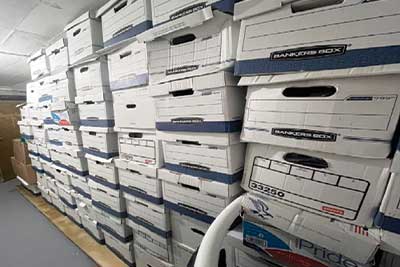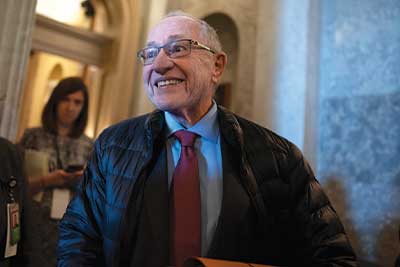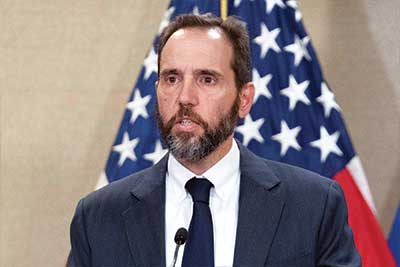
Will They Get Trump?
Two unpleasant facts obtrude from the 37-count federal indictment of President Donald Trump on mishandling classified documents and obstruction of justice.
First, and most importantly for American justice, the indictment is nakedly political. Whatever the charges’ merit, they are part of the Deep State’s eight-year-long crusade to destroy Trump, a crusade that began even before he prevailed in the 2016 GOP primaries. The Russia Collusion Hoax. The two impeachments. Now this. The Deep State’s pursuit of Trump makes Ahab’s sea-hunt for Moby Dick look sane.
Second, Trump could lose this one. Perhaps the only thing between him and a federal prison cell is a GOP president in 2024 — perhaps Trump himself — who pardons him. Trump is in trouble mostly because he still hasn’t learned to keep his mouth shut. After eight years in boiling water because of imprudent or intemperate remarks, one would think a man of his intelligence would have learned not to do or say certain things. You know, like flash classified documents in front of a reporter. Or tell an attorney to withhold documents from government investigators.
Alas and alack, expecting such of Trump is the triumph of hope over experience.
Yet the merit of the charges is unimportant. Trump didn’t intend to endanger the country. Never was national security compromised. No one seriously argues that it was, because they know the truth; political mischief is afoot. The purpose of the prosecution isn’t seeking justice, but instead wrecking a former president who didn’t play ball with the Deep State, and sending a message to future candidates who entertain similar dissident ideas.
And so for the first time in American history, a president has permitted the Department of Justice to arrest a political opponent. As politics in this country goes, that’s dirty pool, and if Joe Biden’s DOJ succeeds, American justice, in all its majesty, will be forever tainted and untrustworthy. Indeed, that the DOJ even indicted Trump for something that other presidents including Sleepy Joe have done suggests that the department and its seemingly omnipotent police force, the FBI, are hopelessly politicized and corrupt.
Not that we didn’t already know that.
Show and tell: Special counsel Jack Smith indicted former President Donald Trump under the Espionage Act for storing classified documents at this Mar-a-Lago estate, then discussing and perhaps showing them to a writer. (AP Images)

A Key Allegation That Could Sink POTUS 45
But let’s stick with the allegations, given that Biden and his Stakhanovite prosecutors aren’t on trial, and Trump is. Special counsel Jack Smith has charged POTUS 45 with 31 violations of the Espionage Act. That statute — 18 U.S. Code § 793 (e) / “Gathering, transmitting or losing defense information” — doesn’t just forbid passing classified documents to a foreign government. It punishes willfully mishandling documents.
The indictment imperils Trump for that reason alone, as Trump’s impeachment attorney Alan Dershowitz averred to Fox News’s Larry Kudlow.
Dershowitz rightly observed that no other president has been or would have been charged for taking classified documents when he left office. But that doesn’t help Trump, who must defend himself even if the prosecution is obviously political.
Despite the indictment’s enormity, Dershowitz said, Trump must worry about one paragraph.
Trump and two aides met with a writer to discuss a book about White House Chief of Staff Mark Meadows on July 21, 2021 at Trump’s Bedminster Club, the indictment alleges. Trump wanted to disprove a “senior military official’s” claim that Trump “might order an attack on Country A and that the Senior Military Official advised TRUMP against doing so.”
The attack, Trump claimed, was the “senior military official’s” idea. “Upon greeting the writer, publisher, and his two staff members, TRUMP stated, ‘Look what I found, this was [the Senior Military Official’s] plan of attack, read it and just show … it’s interesting.’”
The exchange between Trump and the writer and a staffer is damning:
TRUMP: Well, with [the Senior Military Official] — uh, let me see that, I’ll show you an example. He said that I wanted to attack [Country A]. Isn’t it amazing? I have a big pile of papers, this thing just came up.
Look. This was him. They presented me this — this is off the record, but — they presented me this. This was him. This was the Defense Department and him.
WRITER: Wow.
TRUMP: We looked at some. This was him. This wasn’t done by me, this was him. All sorts of stuff — pages long, look.
STAFFER: Mm.
TRUMP: Wait a minute, let’s see here.
STAFFER: [Laughter] Yeah.
TRUMP: I just found, isn’t that amazing? This totally wins my case, you know.
STAFFER: Mm-hm.
TRUMP: Except it is like, highly confidential.
STAFFER: Yeah. [Laughter].
TRUMP: Secret. This is secret information. Look, look at this. You attack, and — by the way, isn’t that incredible?
STAFFER: Yeah.
TRUMP: I was just thinking, because we were talking about it. And you know, he said, “he wanted to attack [Country A]” ...
STAFFER: You did.
TRUMP: This was done by the military and given to me. I think we can probably, right?
Uh …
STAFFER: I don’t know, we’ll, we’ll have to see. Yeah, we’ll have to try to —
TRUMP: Declassify it.
STAFFER: — figure out a — yeah.
TRUMP: See as president I could have declassified it.
STAFFER: Yeah. [Laughter]
TRUMP: Now I can’t, you know, but this is still a secret.
STAFFER: Yeah. [Laughter] Now we have a problem.
TRUMP: Isn’t that interesting?
“At the time of this exchange, the writer, the publisher, and TRUMP’s two staff members did not have security clearances or any need-to-know any classified information about a plan of attack on Country A,” the indictment alleges.
Trump likewise conversed with a representative from a political action committee.

Honest talk: Former Harvard Law School professor Alan Dershowitz said the indictment is political, and that no other president has even been so charged. (AP Images)
Trump’s Attorney: Lawer-client Privilege Blown
Another of Trump’s major troubles, although Dershowitz didn’t mention it, is notes from his attorney, Evan Corcoran, identified as Trump Attorney 1 in the indictment. Smith used the crime-fraud exception to attorney-client privilege to procure Corcoran’s notes of meeting with Trump. Those notes reveal that Trump “endeavored to obstruct the FBI and grand jury investigations and conceal his continued retention of classified documents,” the indictment says.
“I don’t want anybody looking, I don’t want anybody looking through my boxes, I really don’t, I don’t want you looking through my boxes,” Trump said, Corcoran noted.
Trump also asked, “What happens if we just don’t respond at all or don’t play ball with them?” and, “Wouldn’t it be better if we just told them we don’t have anything here?”
“Isn’t it better if there are no documents?” he asked.
Accusing Trump of “false certification to the FBI and the Grand Jury,” the indictment alleges that Corcoran reviewed the documents, found 38 marked “classified,” and placed them in a Redweld folder that he sealed with clear duct tape.
“Did you find anything?” Trump asked. “Is it bad? Good?”
Then Trump suggested with a hand motion that Corcoran pull documents he wanted to keep:
TRUMP and Trump Attorney 1 then discussed what to do with the Redweld folder containing documents with classification markings and whether Trump Attorney 1 should bring them to his hotel room and put them in a safe there. During that conversation, TRUMP made a plucking motion, as memorialized by Trump Attorney 1:
He made a funny motion as though — well okay why don’t you take them with you to your hotel room and if there’s anything really bad in there, like, you know, pluck it out. And that was the motion that he made. He didn’t say that.
The allegations about Trump’s showing classified documents to the writer and urging his attorney to withhold classified documents the attorney knew the government sought are just two in the 44-page indictment.
But they are two of the most damaging, and they are bad enough.
In addition to the 31 charges under the Espionage Act, the indictment alleges false statements, conspiracy to obstruct justice, and a scheme to conceal documents.
Also facing charges is Trump’s major domo, Waltine Nauta.
Selective persecution: Jack Smith has indicted Trump for a “crime” other presidents and government officials have committed, including President Joe Biden, former Secretary of State Hillary Clinton, and Sandy Berger, national security advisor to President Bill Clinton. (AP Images)

Turley: Time Is the Key Factor
Bad as it looks for Trump, all is not lost.
Democratic law professor Jonathan Turley, who keeps a level head when discussing Trump’s legal problems, said that the prosecutor’s “great problem is not Trump, but time.”
That’s because DOJ does not take actions that could affect elections, Turley wrote. That wasn’t true when the FBI, a DOJ subsidiary, hoked up the Russia Collusion Hoax, but in this case, Turley wrote, Smith wants a trial before August to keep up appearances.
“The Justice Department has long followed a rule that it should not take actions that could influence elections,” Turley wrote:
While there are ambiguities around the meaning of this policy, many legal observers read this rule as kicking in 90 days before an election.
The first primary elections are scheduled for the first week of next February. That places the redline for prosecutors in the first week of November.
Since the Justice Department has generally followed this rule, a departure for Trump would reinforce the view of almost half of Americans that the charges are politically motivated.
However, a failure to try the case before November could mean pushing the trial until after the election.
That would help Trump, of course. If he lands in the White House again, he will pardon himself. Other GOP candidates have promised a pardon as well.
The 90-day custom explains why Smith mentioned the right to a “speedy trial” during his news conference, Turley continued. Under the Sixth Amendment to the Constitution and federal statute, that trial would begin within 70 days. That’s August.
Still, “criminal defendants routinely waive the right to a speedy trial because it does not allow them to fully prepare for trial. The Trump team would be legally insane not to waive.”
Delays would follow:
After a waiver, the Trump team can then delay matters further by filing a series of challenges on threshold issues — ranging from the use of the Espionage Act to relying on the compelled testimony of Trump’s former counsel. After a period of briefing before the trial court, appellate courts could delay the matter for months depending on whether they expedite review.
Another problem facing Smith will be selecting an impartial jury because of Trump’s notoriety.
Last, Turley wrote, “neither the defense nor the prosecution can lose one,” meaning lose one of the 37 counts.
Trump must “run the table” because prison time — Trump is 77 years old — might kill him.
Though Sandy Berger, President Bill Clinton’s national security advisor, copped to a misdemeanor plea when he purloined classified documents, others have gone to prison. Trump, Turley argued, is unique because DOJ is clearly out to get him. So prison time is not out of the question.
On the other hand, “Smith cannot lose a single juror without facing a hung jury.”
In Trump’s favor is a similar case, Judicial Watch’s Michael Bekesha wrote for The Wall Street Journal.
“Although the indictment against Donald Trump doesn’t cite the Presidential Records Act [PRA], the charges are predicated on the law,” he wrote:
The indictment came about only because the government thought Mr. Trump took records that didn’t belong to him, and the government raided his house to find any such records.
This should never have happened. The Presidential Records Act allows the president to decide what records to return and what records to keep at the end of his presidency. And the National Archives and Records Administration can’t do anything about it. I know because I’m the lawyer who lost the “Clinton sock drawer” case.
That case involved Clinton’s hiding audio recordings of his conversations in his sock drawer, then taking them from the White House when he left office.
Bekesha led Judicial Watch’s legal battle to get those recordings declared presidential documents, arguing that the National Archives and Records Administration (NARA) should have them. Bekesha and Judicial Watch lost.
“In defending NARA, the Justice Department argued that NARA doesn’t have ‘a duty to engage in a never-ending search for potential presidential records’ that weren’t provided to NARA by the president at the end of his term,” Bekesha wrote:
Nor, the department asserted, does the Presidential Records Act require NARA to appropriate potential presidential records forcibly. The government’s position was that Congress had decided that the president and the president alone decides what is a presidential record and what isn’t. He may take with him whatever records he chooses at the end of his term.
Judge Amy Berman Jackson agreed: “Since the President is completely entrusted with the management and even the disposal of Presidential records during his time in office,” she held, “it would be difficult for this Court to conclude that Congress intended that he would have less authority to do what he pleases with what he considers to be his personal records.”
Judge Berman added that “the PRA contains no provision obligating or even permitting the Archivist to assume control over records that the President ‘categorized’ and ‘filed separately’ as personal records. At the conclusion of the President’s term, the Archivist only ‘assumes responsibility for the Presidential records.’… PRA does not confer any mandatory or even discretionary authority on the Archivist to classify records. Under the statute, this responsibility is left solely to the President.”
I lost because Judge Jackson concluded the government’s hands were tied. Mr. Clinton took the tapes, and no one could do anything about it.
Thus, Bekesha argues, even if Trump took classified documents, they were his to take, and no one could stop him.
If true, then the FBI raid on Mar-a-Lago was illegal, and the ensuing indictment, which, again, accuses Trump of violating the Espionage Act, is unjust and a judge should dismiss the case.
Dershowitz: Time for Trump to Shut Up
Speaking to Kudlow, Dershowitz said that Trump’s yakety-yakking to the writer is more perilous than the other charges.
“The stuff about moving boxes, that’s all covered by the Presidential Records Act, probably not criminal at all,” he told Kudlow. Those charges can “easily be defeated.”
Not so for the allegations involving the writer:
This is the one that should be worrisome to the president, and he may have an answer for it. He may be able to say, “look, I was just showing off a little bit. I didn’t really have them read the documents. I just flashed them in front of their eyes to show them, look I’m the former president, and what I’m telling you is true, these documents prove it.”
Dershowitz said that the Espionage Act, a “horrible statute” passed in 1917 to silence dissidents opposed to U.S. entry into World War I, covers passing classified information to those who are not permitted to see it.
Noting that the document kerfuffle is really a civil, not a criminal, dispute, Dershowitz observed that Smith indicted Trump for willfully, not negligently, sharing classified information. Hillary Clinton skated away from an indictment for virtually the same offense, and President Biden stored classified documents in his garage and at his bogus “center” for “Diplomacy and Global Engagement.” Sandy Berger, national security advisor to President Bill Clinton, was slapped on the wrist for the same offense.
“We don’t have equal justice here,” the Harvard law professor emeritus said:
The Get Trump attitude is still prevalent. The only reason they opened this investigation — they haven’t opened investigations into other former presidents to see what material they took home with them — this is selective investigation, no doubt.
Indeed it is.
“It’s an extraordinarily dangerous indictment, potentially dangerous to the rule of law,” Dershowitz said. “Dangerous to the neutral application of criminal justice and dangerous to establishing a precedent that each side will weaponize the criminal justice system against their political opponents.”
Speaking to NewsNation TV network, Dershowitz said that Trump’s difficulty retaining top-flight lawyers is a “stain” on DOJ. Lawyers who work for Trump, as he wrote in his book Get Trump: The Threat to Civil Liberties, Due Process, and Our Constitutional Rule of Law, fear retaliation from a group called 65 Project. Two contacted Dershowitz after Trump was indicted to say they wouldn’t represent the former president.
As for Trump, the relentless campaign to destroy him has finally borne fruit. The Russia Collusion Hoax collapsed and two impeachments failed. But now, using the DOJ, Biden might not only stop Trump from becoming president but also wreck his life forever. That’s what Biden said he would do, after all.
“We just have to demonstrate that he will not take power if he does run, making sure he — under legitimate efforts of our Constitution — does not become the next president again,” Biden said in November.
Well, the political prosecution of Trump for taking documents that some convincingly argue he was entitled to keep seems to be what Biden meant.
If Donald John Trump is harpooned and sinks to the bottom of the sea, so go the rest of us.

